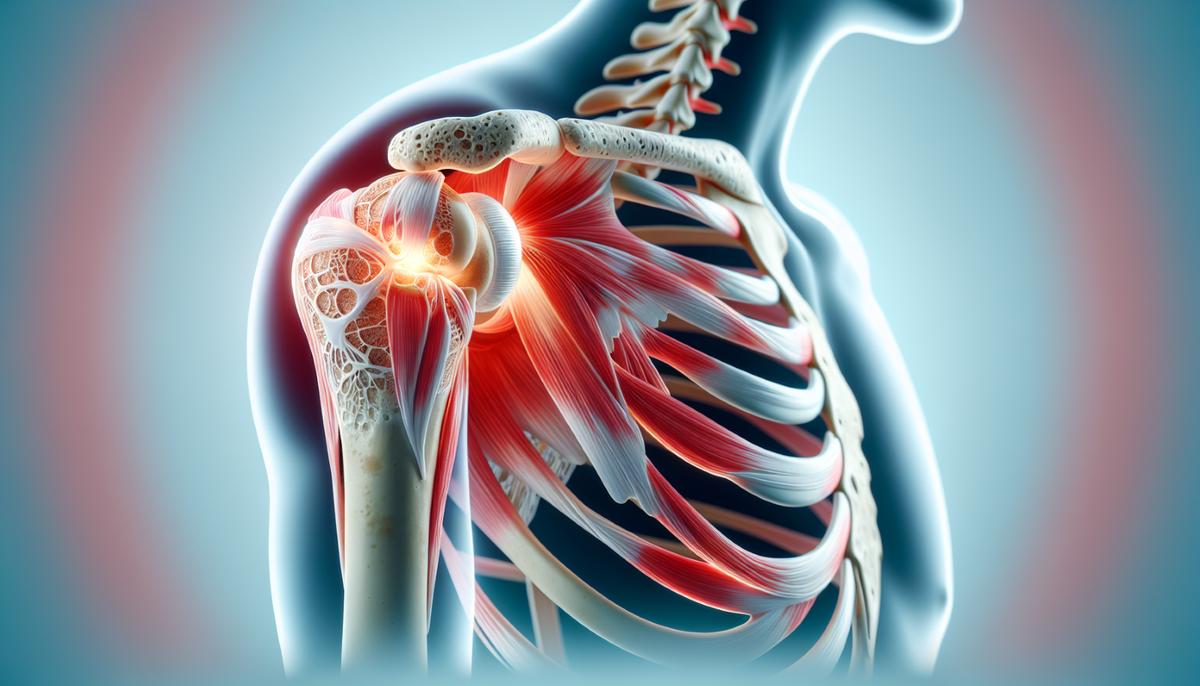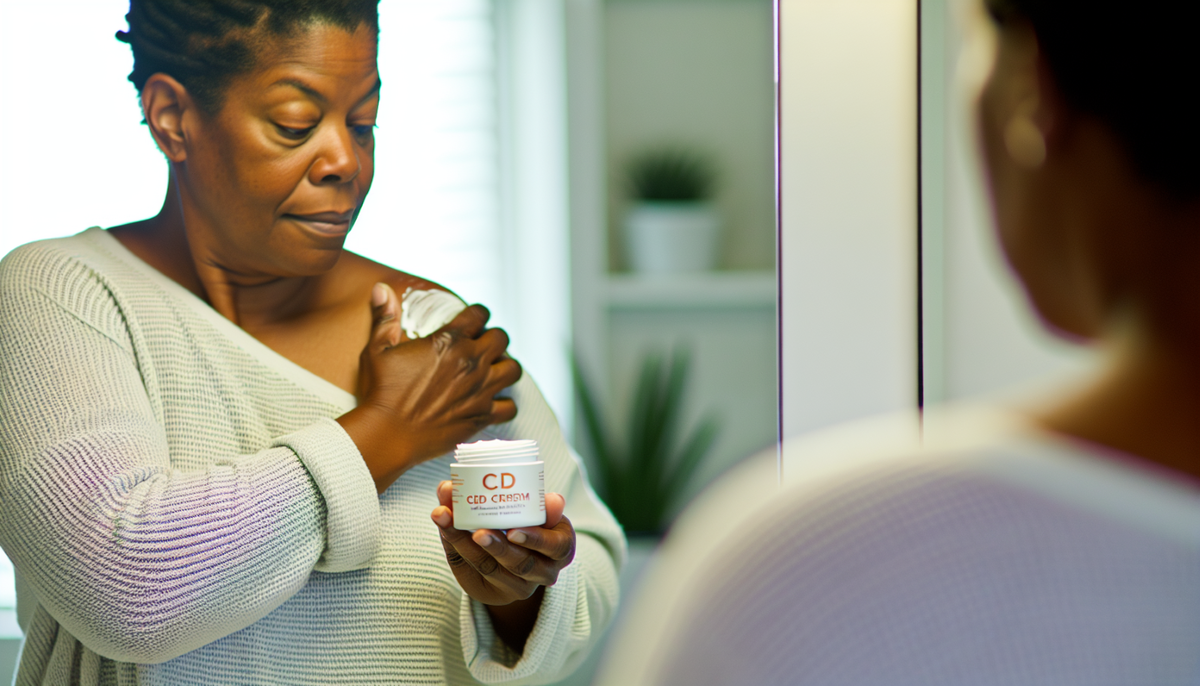CBD for Shoulder Pain Relief: How It Works
Written by: Daniel Fayad, Subject Matter Expert and Website President
Published: March 15, 2024; Last updated: April 6, 2024
- 1. Key Takeaways
- 2. Understanding Shoulder Pain and CBD’s Role
- 2.1 Acute vs. Chronic Shoulder Pain
- 2.2 The Science Behind CBD and Pain Management
- 3. Exploring CBD Oil for Shoulder Pain Relief
- 3.1 Sublingual CBD Oil: Fast-Acting Relief
- 3.2 Topical CBD Solutions: Targeted Application
- 4. CBD and Inflammation: A Natural Anti-Inflammatory
- 4.1 How CBD Reduces Inflammation
- 4.2 Comparing CBD to Traditional Anti-Inflammatory Drugs
- 5. CBD Products for Specific Shoulder Conditions
- 5.1 Choosing CBD for Frozen Shoulder
- 5.2 CBD for Torn Rotator Cuff and Post-Surgery Recovery
- 6. How to Use CBD Effectively for Shoulder Pain
- 6.1 Determining the Right Dosage
- 6.2 Full Spectrum CBD Oil vs. CBD Isolate
- 7. Additional Remedies and Tips for Managing Shoulder Pain
- 7.1 Physical Therapy and Exercise
- 7.2 Cold Therapy and Heat Packs
- 8. Summary
- 9. Frequently Asked Questions
- 9.1 What CBD is best for muscle pain?
- 9.2 What is the best method of CBD for chronic pain?
- 9.3 Is CBD oil safer than ibuprofen?
- 9.4 Will CBD help torn rotator cuff?
- 9.5 How does CBD provide relief for shoulder pain?
- 9.6 References
Shoulder pain is a common ailment that can hinder your daily activities, but did you know that a natural alternative, CBD for shoulder pain, might provide the relief you seek? Cannabidiol, or CBD, is a hemp plant compound known for its potent anti-inflammatory and analgesic properties. But how does it work? And can it help with shoulder pain? Read on to discover how CBD interacts with your body’s endocannabinoid system to alleviate pain and inflammation and learn how to use it effectively to manage your shoulder discomfort using CBD for shoulder pain.
Key Takeaways
CBD offers a natural and effective remedy for shoulder pain by providing anti-inflammatory and analgesic benefits, potentially improving sleep quality and reducing muscle tension.
CBD for shoulder pain can be utilized through sublingual administration for rapid relief or topical application for targeted results; appropriate dosage is critical and can vary per individual’s needs.
In contrast to traditional anti-inflammatory drugs, which come with significant side effects, CBD presents a safer alternative to manage shoulder pain and inflammation, with a role in postoperative recovery as well.
Understanding Shoulder Pain and CBD’s Role

Shoulder pain can be debilitating, affecting your ability to perform simple tasks. It can occur for various reasons, including a sudden injury or a chronic condition like arthritis. CBD oil can provide relief, whether it’s an acute sports injury or chronic shoulder pain due to poor posture. CBD, a compound found in the hemp plant, has been shown to have significant anti-inflammatory and analgesic properties, making it a promising natural remedy for both acute and chronic pain, especially in cases of chronic shoulder pain and joint pain.
Some benefits of using CBD oil for shoulder pain include:
Reducing inflammation in the shoulder joint
Alleviating pain and discomfort
Promoting relaxation and reducing muscle tension
Improving sleep quality, which can aid in the healing process
Suppose you’re considering using CBD oil for shoulder pain. In that case, it’s essential to consult with a healthcare professional to determine the appropriate dosage and ensure it won’t interact with any medications you may be taking.
CBD’s efficacy is attributed to its interaction with our body’s endocannabinoid system. This system helps regulate various bodily functions, including pain and inflammation. CBD interacts with the endocannabinoid system to reduce inflammation and manage pain, making it an effective solution for shoulder pain.
Moreover, CBD also aids in relaxing the muscles around the shoulder, alleviating stiffness and spasms, and helping ensure a restful night’s sleep.
Acute vs. Chronic Shoulder Pain
Differentiating between acute and chronic shoulder pain is essential when discussing shoulder pain. Acute shoulder pain is typically attributed to a sudden injury, such as a dislocation or fractures in the collarbone or upper arm bone. On the other hand, chronic shoulder pain is often associated with degenerative conditions such as a rotator cuff tear or shoulder impingement, usually resulting from repetitive motions or wear and tear.
Common symptoms of shoulder injuries include weakness in the shoulder, difficulty lifting objects, and intense pain in the case of a rotator cuff tear. In cases of severe rotator cuff tears or dislocations, surgery may be necessary. On the other hand, for chronic conditions such as rotator cuff tears, physical therapy may be recommended for pain relief.
Regardless of the cause of your shoulder pain, CBD has the potential to relieve pain by modulating pain perception and relieving pain in other areas as well.
The Science Behind CBD and Pain Management
Having established CBD’s potential for both acute and chronic shoulder pain relief, let’s delve into its working mechanism. The answer lies in the unique properties of CBD, a predominant cannabinoid found in hemp plants, a variety of cannabis plants that contains less than 0.3% THC. Unlike marijuana, hemp has low THC levels and high CBD content, which is non-psychoactive and recognized for its pain-relieving and therapeutic attributes. Some of the critical properties of CBD include:
Non-psychoactive
Pain-relieving
Anti-inflammatory
Muscle relaxant
Neuroprotective
These properties make CBD a practical option for managing shoulder pain.
CBD demonstrates analgesic properties that effectively alleviate shoulder pain by interacting with vanilloid receptors in our body, which play a crucial role in pain regulation. Moreover, CBD’s anti-inflammatory traits contribute to its pain-relieving effects. It engages with the body’s endocannabinoid system by decreasing inflammation and regulating immune cells, thereby alleviating pain. This interaction is pivotal in CBD’s capacity to provide relief from ailments like shoulder pain, positioning it as a prospective choice for pain management.
Exploring CBD Oil for Shoulder Pain Relief
Now, with a grasp of the science underlying CBD’s analgesic properties, we can examine its practical application for shoulder pain relief. One of the most common ways to use CBD for pain management is in the form of CBD oil. CBD oil can be consumed sublingually (under the tongue) or applied topically to the area of discomfort.
Sublingual CBD oil is known for its fast absorption, providing optimal anti-inflammatory effects, and making it highly effective for shoulder pain. On the other hand, topical CBD solutions like balms and creams offer targeted relief to the specific area of discomfort. They may contain additional pain-relieving components for a combined impact on shoulder pain. Depending on your specific pain management needs, you may also consider other product types like CBD gummies or capsules.
Sublingual CBD Oil: Fast-Acting Relief
Sublingual CBD oil is administered under the tongue, allowing rapid absorption into the bloodstream, usually within 30 seconds. This method facilitates the onset of pain relief effects within approximately 15 minutes, making it highly effective for managing shoulder pain.
The estimated absorption rate of sublingual CBD oil is between 13-19%, indicating a substantial and prompt entry of CBD into the bloodstream for effective pain relief. In addition to providing rapid pain relief, sublingual CBD oil also offers other health benefits, such as:
Anxiety relief
Anti-seizure properties
Neuroprotective effects
Anti-acne properties
Potential for cancer treatment
Nevertheless, be mindful of potential side effects like:
drowsiness
gastrointestinal issues
dry mouth
reduced appetite
nausea
And exercise caution regarding CBD’s interactions with other medications.
Topical CBD Solutions: Targeted Application
Topical CBD products like creams, lotions, and balms can be applied directly to the skin over the affected area. This allows for targeted pain relief. This application method allows for precise relief, making it an excellent option for localized muscle tension and inflammation in the neck and shoulders, demonstrating effectiveness for conditions such as arthritis.
Certain topical CBD products may contain additional ingredients like menthol and camphor, known for their pain-relieving properties. These ingredients work synergistically with CBD to enhance the product’s overall efficacy in alleviating pain and inflammation.
Hence, topical CBD solutions might be an ideal selection for those seeking localized relief.
CBD and Inflammation: A Natural Anti-Inflammatory

Inflammation is a common symptom associated with shoulder pain. Fortunately, CBD’s natural anti-inflammatory properties can help reduce shoulder inflammation, relieving conditions such as tendinitis resulting from shoulder infringement.
Muscle fatigue can often lead to inflammation, soreness, and shoulder fatigue. Here, the anti-inflammatory properties of CBD can be advantageous in addressing these symptoms by decreasing the associated inflammation. For conditions like rotator cuff tendinitis, which involves inflammation of tendons within the rotator cuff, CBD’s anti-inflammatory properties can be particularly beneficial.
How CBD Reduces Inflammation
CBD reduces inflammation by modulating immune cells, such as neutrophils and T cells, and activating CB2 receptors within the endocannabinoid system, which plays a crucial role in inflammation modulation.
In addition, CBD also plays a role in mitigating oxidative stress by decreasing the production of reactive oxygen species (ROS) and regulating mitochondrial function, both crucial in the body’s inflammatory responses.
CBD’s ability to inhibit the production of pro-inflammatory mediators and stimulate anti-inflammatory enzymes also contributes to its overall anti-inflammatory effects, making it an effective natural remedy for shoulder inflammation.
Comparing CBD to Traditional Anti-Inflammatory Drugs
While traditional anti-inflammatory drugs like NSAIDs are commonly used for pain relief, they often come with a host of side effects, such as:
Stomach ulcers
Gastrointestinal bleeding
Kidney issues
Heightened risk of heart attack or stroke
On the other hand, CBD, particularly when combined with THC, has been shown to have fewer side effects and significant potential in reducing postoperative pain.
Studies have shown that CBD can effectively reduce post-surgery pain after shoulder surgeries, including rotator cuff surgery, without any safety concerns. This suggests that CBD could be a safer alternative to traditional pain medications for managing shoulder pain, particularly in the postoperative recovery phase.
CBD Products for Specific Shoulder Conditions
While CBD can help manage general shoulder pain, it can also offer significant benefits for specific shoulder conditions such as frozen shoulder and torn rotator cuff, for individuals experiencing frozen shoulder pain, products like Nature’s Legend CBD Freeze Cream, Hapihemp CBD+ Oil Roller, and HapiHemp Full Spectrum CBD Oil 5% Natural are recommended.
CBD also plays a crucial role in the recovery process of a torn rotator cuff by mitigating pain, inflammation, muscle tension, and stiffness in the affected area. Studies have demonstrated that a CBD-infused orally absorbed tablet has been effective in alleviating pain following shoulder surgery, suggesting that CBD could be particularly beneficial for post-surgery recovery.
Choosing CBD for Frozen Shoulder

Frozen shoulder, or adhesive capsulitis, is characterized by the thickening and tightening of shoulder joint tissues, resulting in a restricted range of motion and potential joint inflammation. While further research is required, there is some indication that CBD may offer benefits in reducing the pain and inflammation linked to a frozen shoulder.
For individuals experiencing frozen shoulder pain, it is advisable to consider Nature’s Legend CBD Freeze Cream, Hapihemp CBD+ Oil Roller, and HapiHemp Full Spectrum CBD Oil 5% Natural. Precisely, topical CBD creams are thought to provide secure and efficient pain relief for the neck and shoulder region.
CBD for Torn Rotator Cuff and Post-Surgery Recovery
A torn rotator cuff is a common shoulder injury that can cause significant pain and discomfort. CBD can aid in the recovery process of a torn rotator cuff by:
Mitigating pain
Reducing inflammation
Relieving muscle tension
Alleviating stiffness in the affected area
Research has shown that CBD has several potential benefits for post-surgery recovery, including:
Alleviating pain following shoulder surgery, with no reported safety issues
Reducing postoperative pain when combined with THC
Complementing opioid pain medications for improved pain relief and possibly reduced side effects
These findings suggest that CBD could be particularly beneficial for post-surgery recovery.
How to Use CBD Effectively for Shoulder Pain
For effective use of CBD for shoulder pain, comprehending the determination of the correct dosage is crucial. The suggested initial dosage of CBD for alleviating shoulder pain is 5mg or 10mg, but this can vary depending on factors such as body weight and the severity of pain.
In selecting a CBD product, you can opt for either full-spectrum CBD oil or CBD isolate. Full-spectrum CBD oil contains all the cannabinoids, terpenes, and other beneficial compounds in the hemp plant, whereas CBD isolate is purely CBD, devoid of any other compounds.
Determining the Right Dosage
Determining the correct CBD dosage for shoulder pain can depend on a variety of factors. Body weight can impact the CBD dosage, with individuals with a higher body weight potentially requiring higher dosages. Similarly, the severity of shoulder pain can have an impact on the appropriate CBD dosage, with more severe or persistent pain possibly requiring a higher dosage.
Other factors that can influence the optimal CBD dosage for pain relief include the method of administration and the potency of the CBD oil. It’s essential to customize the dosage based on your unique characteristics and consult a healthcare professional for personalized guidance.
Full Spectrum CBD Oil vs. CBD Isolate
When choosing a CBD product, you can select between full-spectrum CBD oil and CBD isolate. Full-spectrum CBD oil contains all the cannabinoids, terpenes, and other beneficial compounds in the hemp plant, whereas CBD isolate is purely CBD, devoid of any other compounds.
Including additional cannabinoids and terpenes in full-spectrum CBD oil can enhance its efficacy for pain relief through the entourage effect, which encompasses the synergistic interactions between cannabinoids and terpenes. On the other hand, CBD isolate offers the advantage of being purely CBD, without any other hemp plant compounds, which can be beneficial for individuals seeking to avoid THC or other cannabinoids.
Additional Remedies and Tips for Managing Shoulder Pain
Alongside CBD, alternative remedies and strategies exist for shoulder pain management. Regular physical therapy and exercise are crucial in preserving shoulder health and mobility. Occupational therapy can provide tailored guidance on performing daily tasks with minimized shoulder strain, ultimately contributing to pain management.
Another effective method for managing shoulder pain involves cold therapy and heat packs. Cold therapy can reduce inflammation and swelling and minimize tissue damage, leading to pain relief and a faster recovery. On the other hand, heat packs can enhance blood flow to the affected area and assist in the relaxation of tightened and sore muscles, which can be particularly beneficial in helping to relieve shoulder pain.
Physical Therapy and Exercise

Physical therapy and exercise are crucial in maintaining shoulder health and mobility. Pendulum exercises, arm circles, and shoulder rolls are commonly recommended for individuals experiencing shoulder pain to aid in pain relief and improve mobility.
Physical therapists utilize exercises, manual therapy, and various techniques to alleviate pain, enhance muscle strength and stability, improve shoulder function, and aid recovery for patients with shoulder injuries. It’s generally recommended to perform shoulder exercises at least once daily, but it’s essential to consult a healthcare professional or physical therapist for personalized guidance. Some common shoulder exercises include:
Shoulder circles
Shoulder shrugs
Shoulder presses
External rotations
Internal rotations
Wall push-ups
Scapular squeezes
These exercises can help improve the range of motion, strengthen the muscles around the shoulder joint, and promote healing.
Cold Therapy and Heat Packs
Cold therapy, also called cryotherapy, is effective for pain and swelling management, particularly within the initial 24 to 72 hours following a sudden injury. To administer cold therapy, it’s advised to ice the affected shoulder for a minimum of 72 hours after the injury or until the swelling subsides, utilizing an ice pack enclosed in a towel to safeguard the skin.
On the other hand, heat therapy is advantageous for relaxing tightened and sore muscles and loosening the shoulder after pain and tension have set in by enhancing blood flow to the area. It’s essential, however, to exercise caution and adhere to correct procedures to mitigate potential risks such as heightened swelling, inflammation, or burns.
Summary
In conclusion, CBD’s natural anti-inflammatory and analgesic properties make it a promising alternative for managing both acute and chronic shoulder pain. Whether consumed as oil, applied topically, or taken as gummies or capsules, CBD offers a versatile approach to pain management. CBD can provide substantial relief from frozen shoulder to torn rotator cuff for various shoulder conditions. However, it’s important to remember that the correct dosage and product type can vary depending on individual needs and conditions. When combined with additional remedies such as physical therapy, exercise, cold therapy, and heat packs, CBD can contribute to effective and holistic pain management.
Frequently Asked Questions
What CBD is best for muscle pain?
The best CBD for muscle pain management can be found by comparing different CBD products specifically designed for pain relief. Look for CBD creams tailored for muscle pain to find the most effective option.
What is the best method of CBD for chronic pain?
The best method of CBD for pain relief is in pill or capsule form for slow, extended-release, or as an oral tincture for faster effect onset, and it’s essential to start with a small amount and gradually increase the dosage until symptom relief is achieved over a few weeks.
Is CBD oil safer than ibuprofen?
Yes, CBD oil is considered safer than ibuprofen because it is not addictive, cannot be abused, and offers a more natural way to address pain. Plus, it doesn’t carry the risk of smelling like marijuana.
Will CBD help torn rotator cuff?
Yes, CBD is a promising tool for pain management after arthroscopic rotator cuff repair, as presented at the American Academy of Orthopaedic Surgeons 2022 Annual Meeting. Research suggests it may be a viable alternative for pain management after the procedure. (1)
How does CBD provide relief for shoulder pain?
CBD provides relief for shoulder pain by interacting with the body’s endocannabinoid system to reduce inflammation and manage pain, making it an effective solution.
References
Alaia, M. J., Hurley, E. T., Vasavada, K., Markus, D. H., Britton, B., Gonzalez-Lomas, G., Rokito, A. S., Jazrawi, L. M., & Kaplan, K. (2022). Buccally Absorbed Cannabidiol Shows Significantly Superior Pain Control and Improved Satisfaction Immediately After Arthroscopic Rotator Cuff Repair: A Placebo-Controlled, Double-Blinded, Randomized Trial. The American journal of sports medicine, 50(11), 3056–3063. https://doi.org/10.1177/03635465221109573
Hall, N., James, B., Bhuiyan, M. A. N., Crane, E., Falgout, C., & Murnane, K. S. (2023). Topical cannabidiol is well tolerated in individuals with a history of elite physical performance and chronic lower extremity pain. Journal of cannabis research, 5(1), 11. https://doi.org/10.1186/s42238-023-00179-8
Frane, N., Stapleton, E., Iturriaga, C. et al. Cannabidiol as a treatment for arthritis and joint pain: an exploratory cross-sectional study. J Cannabis Res 4, 47 (2022). https://doi.org/10.1186/s42238-022-00154-9

Written by Daniel Fayad - Subject Matter Expert and Website President
Dan Fayad is a results-driven healthcare administration expert and content writer. With a Master of Health Administration from the University of Southern California, he’s carved a niche for himself in the dynamic world of healthcare and business development. Dan uses his experience to educate and empower people on their wellness journeys.
Join the CBDeals Club!
Get 10% off your first order and receive our best and exclusive promotions directly to your inbox!

